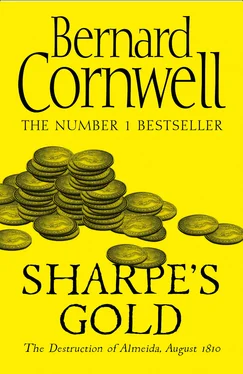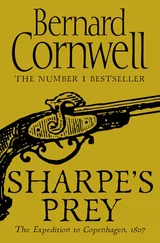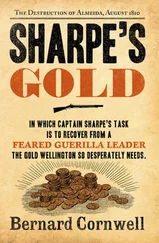Casatejada was beautiful: a small village in a high valley that was built where two streams met and irrigated enough land to keep forty or so houses filled with food. Sharpe began to memorize the layout of the village, two miles away, from the old fortress-tower at one end of the main street, a reminder that this was border country, past the church, to the one large house at the far end of the street. He dared not use his telescope, pointing it eastwards towards the rising sun that might flash on the lens, but even without it, he could see that the house was built round a lavish courtyard and that within its outer walls were stables and outbuildings. He asked Kearsey about the house.
‘Moreno’s house, Sharpe.’
‘He’s rich?’
Kearsey shrugged. ‘Used to be. The family own the whole valley and a lot of other land. But who’s rich with the French here?’ Kearsey’s eyes flicked left, down the street. ‘The castillo . Ruins now, but they used to take refuge there from the raids over the hills.’
There were no animals in sight, no humans, just the wind stirring the barley that should have been harvested. The single village street was empty and Sharpe let his eyes travel beyond the church, across a flat pasture to some stunted fruit trees, and there, half hidden by the orchard, was another church and a bell-tower.
‘What’s the far church?’
‘Hermitage.’
‘Hermitage?’
Kearsey grunted. ‘Some holy man lived there, long ago, and they built the shrine. It’s not used now, except that the graveyard’s there.’ Sharpe could see the walled cemetery through the trees. Kearsey nodded at the hermitage. ‘That’s where the gold is.’
‘Where’s it hidden?’
‘In the Moreno vault, inside the hermitage.’
The village street ran left and right across Sharpe’s vision. To the right, to the south, the street became a road that disappeared in the purple shadows at the far end of the valley, miles away, but to the left the road came nearer to the hills before disappearing into the slopes. He pointed.
‘Where does it go?’
‘Ford at San Anton.’ Kearsey was chewing his grey moustache, glancing up at the white stone on the hilltop, back to the village. ‘They must be there.’
‘Who?’
‘The French.’
Nothing moved, except the wind on the heavy barley. Kearsey’s eyes flicked up and down the valley. ‘An ambush.’
‘What do you mean, sir?’ Sharpe was beginning to understand that in this kind of warfare he knew nothing.
Kearsey spoke quietly. ‘The weathervane on the church. It’s moving. When the Partisans are in the village they jam it with a metal rod so you know they’re there. There are no animals. The French have butchered them for food. They’re waiting, Sharpe, in the village, and they want the Partisans to think they’ve gone.’
‘Will they?’
Kearsey gave his asthmatic bark. ‘No. They’re too clever. The French can wait all day.’
‘And us, sir?’
Kearsey flashed one of his fierce glances on Sharpe. ‘We wait, too.’
The men had piled their arms on the floor of the bowl, and as the sun rose they used the weapons to support spread greatcoats to give themselves shade. The water in the canteens was brackish but drinkable, and the Company grumbled because, before leaving Almeida, Sharpe, Harper and Knowles had virtually stripped each man and taken away twelve bottles of wine and two of rum. Even so, Sharpe knew, someone would have drink, but not enough to do any harm. The sun’s heat increased, baking the rocks, while most of the Company slept, heads pillowed on haversacks, and single sentries watched the empty landscape around the hidden gully. Sharpe was frustrated. He could climb the gully’s rim, see where the gold was stored, see where the survival of the army was hidden in a seemingly uninhabited valley, yet he could do nothing. As midday approached he slept.
‘Sir!’ Harper was shaking him. ‘We’ve got action.’
He had slept no more than fifteen minutes. ‘Action?’
‘In the valley, sir.’
The Company were stirring, looking eagerly at Sharpe, but he waved them down. They must stifle their curiosity and watch, instead, as Sharpe and Harper climbed up beside Kearsey and Knowles on the rock rim. Kearsey was grinning. ‘Watch this.’
From the north, from a track that led down from high pastures, five horsemen trotted slowly towards the village. Kearsey had his telescope extended and Sharpe found his own. ‘Partisans, sir?’
Kearsey nodded. ‘Three of them.’
Sharpe pulled out his glass, his fingers feeling the inset brass plate, and found the small group of horsemen. The Spaniards rode, straight-backed and easy, looking relaxed and comfortable, but their two companions were quite different. Naked men, tied to the saddles, and through the glass Sharpe could see their heads jerking with fear as they wondered what was to happen to them.
‘Prisoners.’ Kearsey said the word fiercely.
‘What’s going to happen?’ Knowles was fidgeting.
‘Wait.’ Kearsey was still grinning.
Nothing stirred in the village. If the French were there they were well hidden. Kearsey chuckled. ‘The ambushers ambushed!’
The horsemen had stopped. Sharpe swung the glass back. One Spaniard held the reins of the prisoners’ horses while the others dismounted. The naked men were pulled from their saddles and the ropes that had tied their legs beneath the horses’ bellies were used to lash their ankles tightly together. Then more rope was produced, thick loops hanging from the Partisans’ saddles, and the two Frenchmen were tied behind the horses. Knowles had borrowed Sharpe’s telescope and beneath his tan he paled, shocked by the sight.
‘They won’t run far,’ the Lieutenant said half in hope.
Kearsey shook his head. ‘They will.’
Sharpe took the glass back. The Partisans were unfastening their saddle-bags, going back to the horses with the roped men. ‘What are they doing, sir?’
‘Thistles.’
Sharpe understood. Along the paths and in the high rocks huge purple thistles grew, often as high as a man, and the Spanish, a horse at a time, were thrusting the heads of the spiny plants beneath the empty saddles. The first horse began fighting, rearing up, but was held firm, until with a final crack over its rump the beast was released and it sprung off, infuriated by the pain, the prisoner jerked by the legs and scraped in a cloud of dust behind the angry horse.
The second horse followed, pulling left and right, zigzagging behind the first towards the village. The three Spaniards mounted and stood their horses quietly. One had a long cigar, and through the telescope Sharpe saw the smoke drift over the fields.
‘Good God.’ Knowles stared unbelieving.
‘No need for blasphemy.’ Kearsey’s gruff reprimand did not hide the excitement in his voice.
The two naked, tied men were invisible in the dust, but, as the horses swerved at a rock, Sharpe caught a glimpse, a flash through the cloud, of a body streaked red, and then the horse was running again. By now the Frenchmen would be unconscious, the pain gone, but the Partisans had guessed right and Sharpe saw the first movement in the village as the gates of Cesar Moreno’s big house were thrown open and cavalry, hidden all morning, rode on to the street. Sharpe saw sky-blue trousers, brown jackets, and the tall fur helmet. ‘Hussars.’
‘Wait. This is the clever bit.’ Kearsey could not hide his admiration.
The Hussars, sabres drawn, cantered down the street to meet the two horses with their terrible attachments. It seemed that the Spanish plan was to end in anticlimax, for the Hussars would rescue the two bloody and battered Frenchmen at the northern end of the village, but then the two horses became aware of the cavalry. They stopped.
Читать дальше












